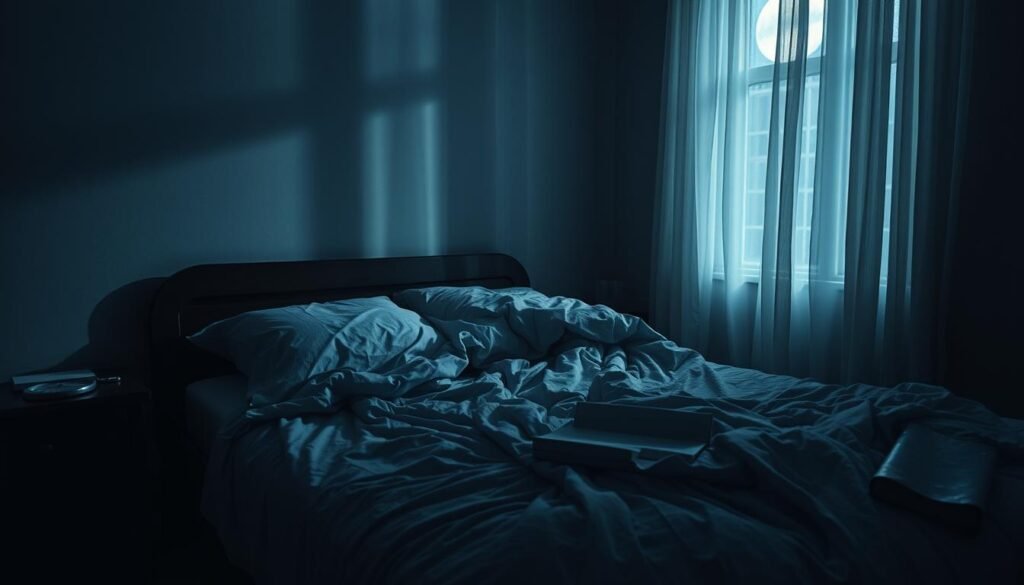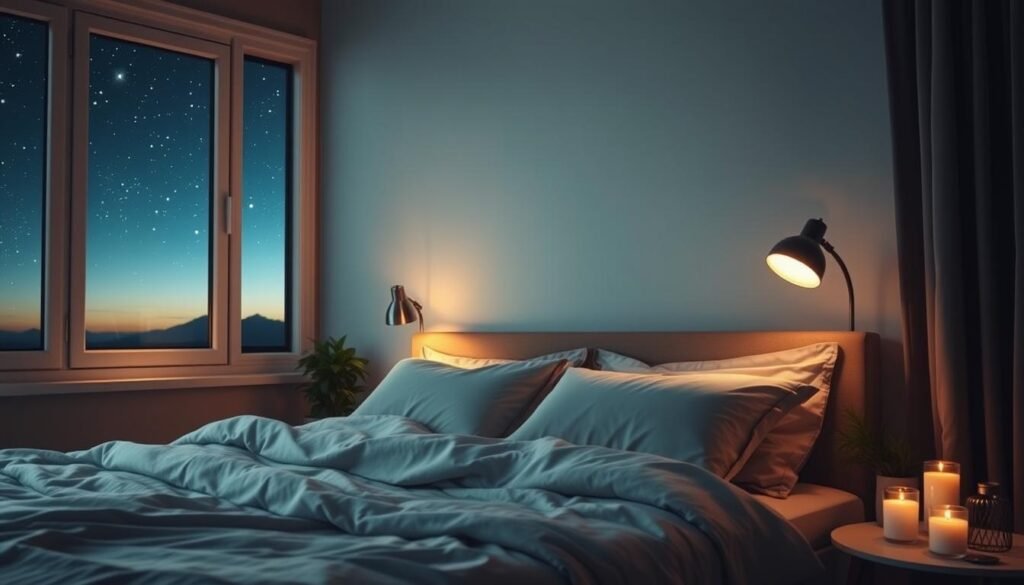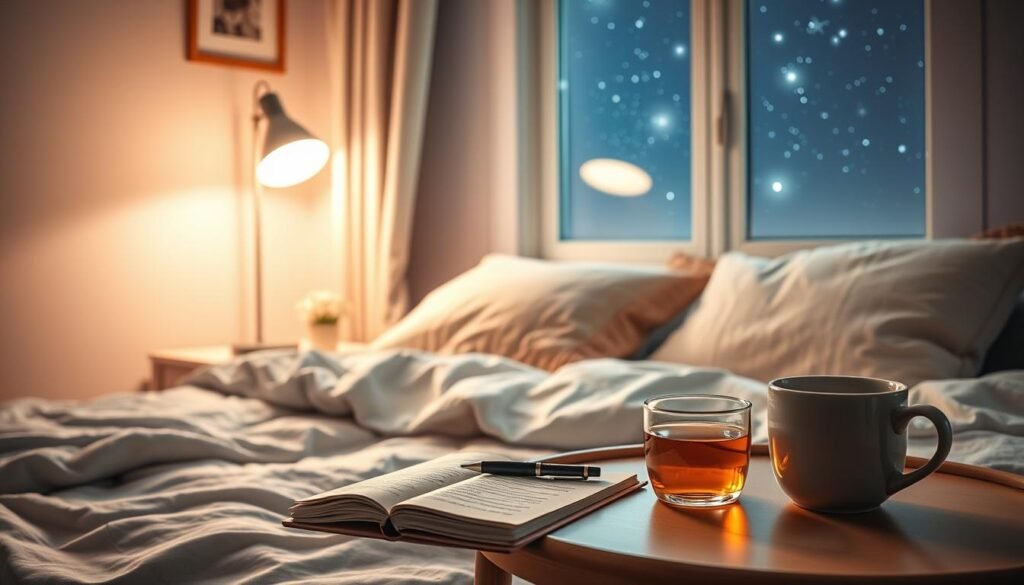Anxiety disorders are very common in the United States. The American Psychological Association says nearly 30% of adults may experience it. Anxiety doesn’t just bring worry and fear. It also leads to sleep problems like insomnia. This situation causes a cycle. Anxiety makes sleep issues worse. In turn, poor sleep affects mental well-being negatively. This article focuses on how anxiety and sleep problems are linked. It will talk about ways to manage anxiety better. Doing so can improve sleep and mental health.
Key Takeaways
- Anxiety disorders are the most common mental health issues in the U.S.
- Individuals with anxiety often experience insomnia and poor sleep quality.
- Sleep disturbances can exacerbate symptoms of anxiety disorders.
- Improving sleep can lead to significant reductions in anxiety symptoms.
- Chronic sleep deprivation can result in long-term health complications.
- Effective anxiety disorder management is essential for enhancing sleep quality.
What Is Anxiety?
Anxiety is when you feel fear, worry, and nervousness. It’s how we all react to stress sometimes. But, it can get too strong for some people, causing a lot of trouble. Knowing about anxiety helps us see the line between feeling nervous and having an anxiety disorder. This disorder can really mess with how someone lives their day-to-day life.
Signs of anxiety include feeling restless, very tired, having a fast heartbeat, and struggling to focus. People with anxiety might not sleep well either. Their minds and bodies can feel the strain in many ways.
Anxiety isn’t the same for everyone. For some, it’s just a short thing because of a tough time. But for others, it sticks around long-term. It can get so bad that it leads to other issues like depression. Working on how to handle anxiety can really make life better.
| Anxiety Symptoms | Impact on Daily Life |
|---|---|
| Restlessness | Difficulty focusing on tasks |
| Fatigue | Low energy levels affecting productivity |
| Rapid heartbeat | Physical discomfort and distraction |
| Sleep disturbances | Impaired cognitive function and irritability |
| Difficulty concentrating | Increased frustration and anxiety |
Types of Anxiety Disorders
Anxiety comes in different forms, each known as a type of anxiety disorder. Knowing these types helps in getting the right help. Generalized anxiety disorder is a common type. People with it worry a lot about everyday things. This worry is hard to control and can make life very stressful.
Panic disorder leads to sudden episodes of intense fear. These episodes can cause physical reactions like a racing heart. The fear of when the next attack will happen adds more stress.
Social anxiety is about the dread of being in social settings. It harms personal and work relationships. People avoid social events to escape this fear. Specific phobias are intense fears of certain things or situations that cause distress.
Obsessive-Compulsive Disorder (OCD) is having unwanted thoughts leading to repetitive behaviors. Post-Traumatic Stress Disorder (PTSD) comes from past trauma. It causes anxiety that affects everyday life.
Finding out the specific type of anxiety disorder someone has is crucial. It guides the creation of a personalized treatment plan. Research on calcium metabolism offers new ways to manage generalized anxiety disorder. For more info on how anxiety affects sleep, check this study.
| Anxiety Disorder Type | Key Symptoms |
|---|---|
| Generalized Anxiety Disorder | Chronic worrying, restlessness, difficulty concentrating |
| Panic Disorder | Panic attacks, rapid heartbeat, fear of dying |
| Social Anxiety Disorder | Fear of social interactions, avoidance behavior |
| Specific Phobias | Irrational fear of specific objects or situations |
| Obsessive-Compulsive Disorder | Unwanted intrusive thoughts, compulsive behaviors |
| Post-Traumatic Stress Disorder | Flashbacks, severe anxiety, emotional numbness |
The Connection Between Anxiety and Sleep Disruption
Anxiety and sleep problems are closely linked, affecting how well we live our lives. If you’re anxious, getting deep sleep becomes hard. This can make your day-to-day life harder. It’s important to understand this link to manage these issues better.
How Anxiety Interferes with Sleep
Anxiety ramps up adrenaline levels, triggering a fight-or-flight mode that stops relaxation. This makes falling asleep tough. People with anxiety might have insomnia symptoms, like not being able to fall asleep or stay asleep. They worry a lot or can’t stop their thoughts. Stress and anxiety can mess with your sleep. This, in turn, can make anxiety even worse.
Sleep Quality and Anxiety Symptoms
Studies show a big link between anxiety and not sleeping well. Those with anxiety disorders often have insomnia symptoms. They struggle to fall asleep or wake up often during the night. They might also have vivid dreams or nightmares. This shows how anxiety can influence the quality of your sleep, leading to stress. When you don’t sleep enough, your anxiety can go up. This creates a cycle that’s tough to escape.
Common Insomnia Symptoms Associated with Anxiety
People with anxiety often find it hard to sleep. Anxiety and insomnia are closely linked, creating a tough cycle to break. Those who have both conditions report many sleep problems. This affects their overall health.
Difficulty Falling Asleep
Many with anxiety struggle to fall asleep. Their minds race, and emotions run high, making relaxation difficult. They stay awake, overwhelmed by worries. Anxiety makes the challenge even tougher, hindering restful sleep. This worrying cycle complicates bedtime even more.
Restless Sleep and Nightmares
Restless sleep is common for those with anxiety. They might toss and turn all night, which breaks their sleep pattern. Nightmares, filled with fear, happen often. These bad dreams tire them out and make anxiety worse. These issues disrupt natural sleep, leaving people exhausted.

| Insomnia Symptoms | Causes Related to Anxiety |
|---|---|
| Difficulty Falling Asleep | Racing thoughts, emotional distress |
| Restless Sleep | Inability to relax, physical tension |
| Nightmares | Anxious thoughts, heightened fear |
Tackling these sleep issues is key to coping with anxiety. Improving sleep can help a lot with mental health. It opens a door to better sleep and lower anxiety.
Impacts of Sleep Deprivation on Mental Health
Not getting enough sleep can greatly affect your mental health. It touches on how we think and feel. This can make things hard for those who don’t sleep enough, especially if they have anxiety.
Cognitive Function and Memory Issues
Sleep loss makes it hard to think, remember, decide, and control emotions. Around 70 million people in the U.S. struggle with sleep problems. This shows how big of an issue it is.
Not sleeping enough makes it hard to focus and remember stuff. This can make daily tasks tougher. People who don’t sleep well often feel anxious and easily upset.
Exacerbation of Psychological Distress
Sleep deprivation can make you feel anxious, tense, and irritable. Not sleeping enough is linked to a higher chance of getting depressed. This shows how closely sleep and mood are connected.
Lacking sleep can make anxiety worse, starting a cycle of more stress. Even a little lack of sleep can make your anxiety spike. This can worsen mental health over time.
It’s important to know about this, as too many people don’t sleep enough. Improving sleep habits can really help your mental and emotional health. For deep information on how lack of sleep affects anxiety, check out this study.
Management Techniques for Anxiety-Related Sleep Issues
Effective strategies are key in managing anxiety-related sleep problems. It’s important to adopt sleep hygiene practices and relaxation techniques. These efforts help create a peaceful sleep setting. Adjusting daily habits and using methods to calm down can make sleep better. This also lowers overall anxiety.
Importance of Sleep Hygiene Practices
To fight insomnia and anxiety, good sleep hygiene is vital. Important practices include:
- Keeping a regular sleep schedule by going to bed and waking up at the same time.
- Creating a perfect sleeping space; make your room cool, dark, and quiet.
- Staying away from caffeine and nicotine before bed.
- Reducing screen time at night, as blue light affects melatonin levels.
Utilizing Relaxation Techniques
Adding relaxation for better sleep to your nightly routine can lessen anxiety. Popular techniques include:
- Deep breathing exercises to relax both mind and body.
- Mindfulness meditation to shift away from anxious thoughts.
- Soft yoga sessions to ease physical strain.
- Writing in a worry journal to deal with stress before sleep.
Regular use of these techniques can grow their effectiveness. Over time, this leads to better sleep habits.

| Relaxation Techniques | Benefits |
|---|---|
| Deep Breathing | Reduces heart rate and promotes tranquility |
| Mindfulness Meditation | Lowers stress and anxiety levels |
| Gentle Yoga | Enhances flexibility and relaxation |
| Worry Journaling | Organizes thoughts and alleviates mental clutter |
Understanding the Bidirectional Relationship Between Anxiety and Sleep
The link between anxiety and sleep is quite intricate. It shows a bidirectional relationship that has a big influence on well-being. People often face increased sleep reactivity when anxious, leading to major sleep issues. As anxiety goes up, getting good sleep becomes harder.
Sleep Reactivity in Anxiety Disorders
Those with anxiety disorders have different levels of sleep reactivity. This means they’re more sensitive to stress affecting their sleep. Such sleep issues are common with anxiety symptoms. Bad sleep can make the fear of going to bed worse, continuing an anxiety sleep cycle.
Cycle of Anxiety and Sleep Disturbance
The anxiety sleep cycle traps you in a harmful loop. Anxiety starts sleep problems like insomnia or restless sleep. This bad sleep then makes the anxiety worse, creating a tough battle. To stop this cycle, recognizing the connection between anxiety and sleep is key.
Luckily, there are ways to tackle it. Managing stress well, practicing relaxation techniques, and having a good sleep routine can help. Tackling both sleep and anxiety issues together improves health significantly. You can find more information in this resource.
Cognitive Behavioral Therapy as a Treatment Option
Cognitive Behavioral Therapy (CBT) is key in treating anxiety and sleep problems. It helps change negative thinking and develops new coping ways. As a treatment for anxiety disorders, it challenges people to face and rethink fears. This leads to less anxiety symptoms.
CBT for Anxiety Disorders
CBT for anxiety shifts how people see and respond to stress. It breaks down harmful thought habits, fostering a healthier way to handle anxiety. With evidence-backed methods, it aids in fighting off irrational thoughts. This improves mental health. The approach works well for many anxiety types, offering a good alternative to pills for lasting care.
Addressing Insomnia with CBT-I
Cognitive Behavioral Therapy for Insomnia (CBT-I) aims at sleep issues tied to anxiety. Studies show 33% to 50% of adults struggle with sleep. CBT-I is known for its results. A study in 2015 showed it cuts the time to fall asleep by 19 minutes. It also boosts sleep quality by 10%.
CBT-I changes sleep-related habits and thoughts. Tips include a steady sleep schedule, a better sleep setting, and keeping a sleep journal for 1 to 2 weeks. The therapy also underlines the importance of good sleep habits. For example, avoiding caffeine and trying relaxation activities help people sleep better. Plus, CBT-I is as effective as sleeping pills without the bad effects. This makes it a top choice for those avoiding medications.
In short, cognitive behavioral therapy is a strong choice for treating anxiety disorders, including insomnia with CBT-I. It works on changing thinking and behavior patterns. Therefore, it leads to better sleep habits. This helps people find lasting freedom from sleep troubles.

Medication Options for Managing Anxiety and Sleep Issues
Medications are key to treating anxiety-related sleep problems. Various anxiety medication types help improve sleep. Selective Serotonin Reuptake Inhibitors (SSRIs) are often recommended to control anxiety.
Benzodiazepines, such as diazepam, alprazolam, and triazolam, treat severe anxiety and insomnia well. They work fast but have a risk of dependency. Non-benzodiazepine sleep aids like zolpidem, eszopiclone, and zaleplon are good options for battling insomnia.
Antidepressants also help with these issues. Sedating ones like amitriptyline, mirtazapine, and trazodone attack both problems. Medications that act like melatonin, such as ramelteon, help with sleep patterns.
Treating anxiety and sleep problems involves many steps. Using effective medication options and therapy like Cognitive Behavioral Therapy (CBT) works well together. It’s important to talk with doctors to find the best plan for you.
| Medication Type | Examples | Primary Use |
|---|---|---|
| Benzodiazepines | Diazepam, Alprazolam, Triazolam | Severe anxiety or insomnia |
| Non-Benzodiazepine Sleep Aids | Zolpidem, Eszopiclone, Zaleplon | Short-term insomnia relief |
| Sedating Antidepressants | Amitriptyline, Mirtazapine, Trazodone | Anxiety and insomnia management |
| Melatonin Receptor Agonists | Ramelteon | Sleep regulation |
Stress Reduction Strategies to Improve Sleep Quality
Making stress reduction a part of your daily life is key to better sleep. Many methods can help ease into sleep and lower anxiety.
Mindfulness Practices for Better Sleep
Mindfulness is a great way to relax and find peace. Meditation, breathing exercises, and muscle relaxation all help reduce stress for better sleep. Doing these activities often makes it easier to calm down at night.
The focus on the here and now helps clear the mind. This sets the stage for a good night’s sleep.
Developing a Consistent Sleep Routine
Having a regular sleep schedule helps you sleep better. Setting up a bedtime routine tells your body it’s time to rest. This matches our natural sleep cycles.
It’s good to avoid electronics and exciting activities before bed. Instead, try some light stretching or reading. A consistent routine improves sleep and helps control anxiety.
Research Findings on Anxiety and Sleep Disruption
Many studies have looked into how anxiety connects with trouble sleeping. These studies focus on the roles of neurotransmitters, hormones, and stats about sleep issues. Knowing this link is key to making good treatments.
The Role of Neurotransmitters and Hormones
Research has found neurotransmitters are crucial for managing anxiety and sleep. Imbalances in serotonin and GABA can hike anxiety and ruin sleep. Stress hormone cortisol also messes with sleep.
Having too much cortisol can mess up sleep patterns. This can worsen things for those already dealing with anxiety. The work of neurotransmitters in mood and sleep shows how tied together they are.
Statistical Insights on Anxiety Disorders and Sleep Problems
A lot of people with anxiety also have sleep problems. About 50% of those with anxiety struggle to sleep well, often dealing with insomnia. At high altitudes, nearly 69% report sleep troubles, showing a big link between anxiety and not sleeping well.
This issue is widespread, affecting lots of people with anxiety and sleep woes. Factors like age, being a medical student, or having high anxiety increase risk. Sleep trouble hits these groups hard.
Building a Better Sleep Environment
Creating a great sleep space is key to better sleep. Getting rid of sleep disruptors greatly helps. Many people don’t realize how much their surroundings affect their sleep.
Minimizing Sleep Disruptors
To sleep well, start by minimizing sleep disruptors like noise and light. Use blackout curtains or white noise machines. A good mattress and pillows, chosen for your comfort, support a restful night.
Creating a Relaxing Bedroom Atmosphere
A relaxing bedroom environment boosts sleep quality. Use calming colors and keep the room at a comfy temperature. Soft lighting also makes the room calming. Avoid screens and active activities before bed to keep the peace. Try aromatherapy with lavender or chamomile for more relaxation. For tips on a better sleep set-up, read about ways to optimize the sleep environment.
Conclusion
Understanding how anxiety and sleep problems are connected is key for good mental health. Many people deal with both. About 40.3% of those with sleep issues also have anxiety. Using methods like cognitive behavioral therapy (CBT) and relaxation can help. Along with good sleep habits, these can make a big difference.
Knowing more about the anxiety-sleep link can lead to better treatments. For example, 42–63% of people with mood disorders also have trouble sleeping. This shows that dealing with anxiety might improve sleep too. By addressing both, people can improve their lives and find better ways to cope.
In summary, it’s important to understand anxiety and its effect on sleep. For anyone facing both issues, getting help and using a full treatment plan is critical. This can lead to real improvements in health. To learn more about this important topic, click here.